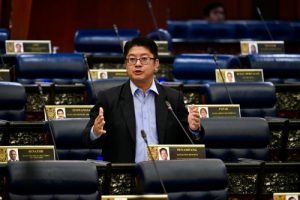 By Mohd Khairy Abdullah @ DG Henry
By Mohd Khairy Abdullah @ DG Henry
KOTA KINABALU (Sabah, Malaysia), November 12, 2025 —When UPKO President Ewon Benedick declared that “there is no appeal, but appealing the grounds of judgment is still an appeal”, it was more than a reaction to the Attorney General’s Chambers (AGC).
It was a direct challenge to the moral and institutional integrity of Malaysia’s federal system — an insistence that justice cannot be managed through linguistic acrobatics, and that federal promises to Sabah cannot be reinterpreted at will.
To international observers, Ewon’s statement transcends the legal debate over Sabah’s 40% revenue entitlement. It cuts to the very foundation of the Malaysian Federation’s social contract — whether the federal government has truly honoured the terms of its creation in 1963.
Ewon draws a clear distinction between the Federal List, which governs administrative responsibilities, and Sabah’s 40% entitlement, which constitutes a binding constitutional right.
This distinction is not semantic but foundational — it defines the hierarchy between federal power and the legal sovereignty of state rights.
In essence, Sabah’s demand is not a plea for favour but a claim to a constitutional obligation.
Yet when the AGC announced that “there will be no appeal” but simultaneously “an appeal will be made on the grounds of judgment,” Ewon read it as a paradox of justice — a manoeuvre to challenge a ruling without admitting to doing so.
Hence his simple but piercing reminder: “An appeal is an appeal.”
It is not merely a linguistic correction; it is a moral rebuke against the elasticity of legal interpretation in the hands of central authority.
Ewon’s resignation from the federal cabinet marked a rare act of moral defiance in a political culture long accustomed to compromise and calculation.
In a system where loyalty often trumps conviction, his decision stands as a principled rejection of expediency over ethics.
It also exposes a growing crisis of institutional trust, where central authorities appear unable — or unwilling — to distinguish between political convenience and constitutional duty.
In global context, this tension mirrors federal crises in other nations — from Scotland to Quebec — where central governments employ narrow constitutional interpretations to curb regional aspirations.
But Malaysia’s case is distinct: Sabah’s struggle is not about secession or identity politics, but about a broken promise — a federal commitment that has been deferred, diluted, and denied for six decades.
The UPKO Supreme Council’s assertion that “only local Sabah parties truly understand the pulse of the state” is more than a slogan.
It signals a reawakening of sub-national political consciousness — a movement to reclaim ownership of Sabah’s future from federal control.
Ewon does not reject Malaysia; he rejects a malformed version of federalism.
His vision is of a Sabah government entirely composed of local parties, reminiscent of the state’s early post-independence leadership in 1963.
In international terms, this represents the maturation of regional political identity — a shift from reactive autonomy to assertive self-governance grounded in democratic legitimacy.
It is a nuanced evolution: not secessionist, but restorative; not rebellious, but principled.
From a legal perspective, the AGC’s stance creates procedural ambiguity and substantive risk.
If the Court of Appeal overturns any part of the High Court’s reasoning, the entire judgment upholding Sabah’s 40% entitlement could be compromised.
This is what Ewon meant when he warned that the findings of the High Court are interdependent and inseparable.
His statement serves as both a legal caution and a moral indictment, warning that federal manoeuvring could erode public faith in the judiciary.
In comparative terms, such tactics exemplify what legal scholars describe as “erosion of judicial sincerity” — when institutions bend procedure to accommodate political discomfort.
The 40% issue has now evolved into a litmus test of Malaysia’s honesty with its own history.
It raises profound questions:
Does Malaysia still remember the true meaning of the federation formed in 1963?
Is Sabah merely an administrative region — or an equal partner in a shared national covenant?
Ewon Benedick’s statement has forced Kuala Lumpur to confront its reflection in the mirror of history.
And that reflection reveals not just a fiscal dispute, but a moral fracture between promise and performance, between law and sincerity.
Ultimately, “An appeal is an appeal” is not just a legal remark.
It is a manifesto of moral resistance against a political system that often sacrifices principle for power.
Sabah does not seek sympathy — it seeks honesty.
And as Ewon Benedick reminds Malaysia and the world, this is no longer merely a political struggle.
It is a test of whether Malaysia still possesses the moral courage to honour its own federal soul.
#SabahFirst
From the village, beginning in the village, to every village — the call for justice now echoes far beyond the hills of Sabah.
![]()

